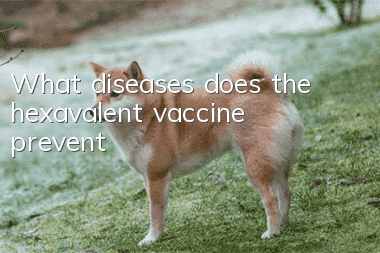Six types of parasites need to be eliminated to raise a healthy dog

Special attention should be paid to deworming dogs. The first thing to note is that since the drugs used to deworm dogs are both effective and safe, owners do not have to worry about serious side effects caused by deworming.
Generally speaking, the common digestive tract parasites in dogs include the following:
1. Nematodes, including roundworms, pinworms, whipworms, hookworms, etc.
2. Tapeworm.
3. Coccidia.
4. Giardia piriformis.
Whether you bought your dog from a pet store or picked it up from the roadside, you must plan a deworming plan for it throughout its life. Puppies are best dewormed for the first time when they are three to six weeks old, once a week for four weeks. After that, deworm once a month until they are six months old. After six months of age, deworm every three months. After they are one year old, deworm them every six months.
If your dog is an adult and often goes outside or may come into contact with other dogs, it is recommended to deworm it every three months. As for pregnant female dogs, it is recommended to deworm once during the mating period, one week before giving birth, and three to four weeks after giving birth.
Before deworming, you must remember to do a physical health check-up for your dog. Owners can take fresh feces (or the doctor can take a fresh feces sample from the anal cover after taking the rectal temperature). , ask your doctor to check for insect eggs. However, it is recommended that, regardless of whether the eggs are detected, as long as the dog is in good health, deworming can be regarded as a routine health care action.
The following are several parasitic diseases that dogs are more commonly infected with, which are provided for reference by owners.
1. Roundworms: Most of the time, pregnant female dogs pass the worms to their fetuses through the placenta. They can also be infected through the mouth. The infection rate is higher in puppies. Because the roundworms absorb nutrients, they will stunt the development of the dogs and produce symptoms such as diarrhea, vomiting, and flatulence. , may also block the bile duct, penetrate the intestinal wall, or cause neurological symptoms. In addition, the larvae of roundworms can penetrate the intestinal wall and spread to various tissues of the body, including the liver, lungs, kidneys, etc., causing ascarid pneumonia. Serious diseases may also be transferred to the fetus, causing serious infection or even death of the fetus or newborn. Owners can judge whether the dog is infected with roundworms by whether the dog is emaciated but has a beer belly.
2. Whipworm: It is mostly an oral infection. The eggs will be excreted with the dog's feces. Dogs infected with whipworm will excrete bright red and fishy smelling diarrhea. The infected puppies will be stunted and anemic; the number of parasites In many cases, the mucosal blood vessels may even be damaged, causing diarrhea or even bloody diarrhea, which can also lead to appendicitis and colitis.
3. Hookworms: Hookworms are very small in size but will suck blood. Symptoms vary depending on the individual and the degree of infection; in mild cases,There are cases of weight loss, vomiting, diarrhea, mucus and blood in the feces; severe dogs may die due to acute anemia or other complications, and may be infected through the placenta, mouth and skin.
4. Tapeworms: Tapeworms will absorb a large amount of nutrients from dogs, causing them to be malnourished and have dry and dull hair. If there are too many tapeworms, they will block the intestines. Dogs infected with tapeworms may have cysts in the anus or mouth. It is the appearance of rice grain-sized segments in the feces that stretch, contract and squirm. Dogs often also have eye droppings.
5. Coccidia: a parasitic disease caused by dogs eating worm eggs. The common symptoms are anorexia, diarrhea, and weight loss. Dogs often have foul-smelling yellow watery diarrhea, and a large amount of coccidia is ejected when they have diarrhea. In addition, puppies The disease in dogs is more serious, often causing catarrhal or hemorrhagic enteritis, bloody diarrhea and death.
6. Giardia pyriformis: Dogs infected with this disease often suffer from diarrhea. The poop they excrete can range from soft poop, muddy poop, to jelly-like poop like chicken poop, or even oily poop. There are oily and watery poops, and sometimes there is blood mixed in the poop.
- How to train a German Shepherd? How to train a German Shepherd!
- There are actually four major reasons for pet dogs losing hair, and poop collectors must pay attention!
- What causes blood in dog’s stool? What medicine should I take?
- Is the mortality rate of dog myelitis high?
- What should I do if my dog has a urinary tract infection?
- Can Poodles Eat Meat? What meat cannot be eaten?
- Symptoms of acute pancreatitis in dogs
- The appearance differences between Akita and Shiba Inu
- Black spots on dogs
- What should I do if my dog has glaucoma?



